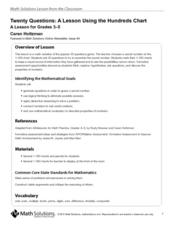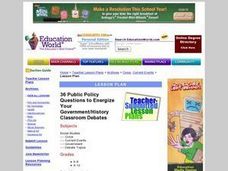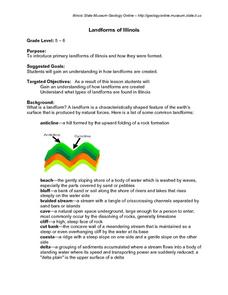Curated OER
Questioning
Practice making predictions by looking at the cover of a book. You can use The Hungry Thing, as suggested here, or any other book you may be reading in class. Use the predictions to talk about good reading strategies. A chart is included...
Novelinks
Nightjohn: Bloom's Taxonomy Questions
After completing Nightjohn, Gary Paulsen's young adult novel about slavery set shortly before the Civil War, readers respond to a series of questions crafted to reflect Bloom's taxonomy.
Robert Frost Farm
Socratic Seminar Format Overview
Whether new to the Socratic seminar format or an experienced veteran of the popular discussion technique, you'll find much to like in a five-page, richly detailed packet that not only details the prep necessary, the process, and the...
Curated OER
Pride and Prejudice: Question Answer Relationship Strategy
Help middle and high school readers access the text with a series of question-answer relationship (QAR) strategies. Using Jane Austen's Pride and Prejudice as an example, the resource prompts learners to ask and answer questions using...
Curated OER
The Outsiders: Question Answer Relationships Strategy
Kids learn best when asking questions about what they have read. Encourage active reading with a comprehension activity based on S.E. Hinton's The Outsiders, in which kids read passages from the beginning of the book and identify...
Curated OER
100 Questions
Students practice problem solving skills by asking questions and participating in a design challenge. In this asking questions lesson, students work in pairs to ask questions to design a solution for a difficult personal problem....
Turabian Teacher Collaborative
How to Find a Research Question
There are so many fascinating topics and concepts to learn about in the world. But where do you start? Begin formulating questions for an argumentative research paper with a guided practice lesson. After coming up with three questions...
EngageNY
Asking and Answering Questions: Reading about a Frog's Habitat
Building upon previous lessons, scholars take to asking and answering questions about a frog's habitat. A partner discussion follows a read-aloud of an informational text in preparation for a worksheet that boosts reading comprehension...
Curated OER
Twenty Questions: The Hundred Chart
Use the 20 Questions game to practice math vocabulary and number properties! Project a hundreds chart and hand one out to learners. Ideally, give them counters (beans would work well) to mark off the chart so you can play multiple times....
Curated OER
36 Public Policy Questions to Energize Your Government/History Classroom Debates
Need topics that are sure to engage your debaters? This list of public policy questions includes such topics as school mascots, regulation of major league baseball, physician-assisted suicide, and violence in video games. A great...
BrainPOP
World History Lesson Plan: Uncovering Essential Questions
Have you ever noticed a news story revolves around an essential question? Scholars research methods of reporting historical events. Working in groups, they use an interactive module to gather information on a historical topic, uncovering...
Curated OER
Shizuko’s Daughter: Question Answer Relationships
Asking questions about what you're reading is an effective way to connect with the text. After kids read passages from Kyoko Mori's Shizuko's Daughter, they identify questions about the passages as Right There, Think and Search, On Your...
Code.org
Encoding and Sending Formatted Text
Introduce your class to encoding text. Pairs work together to create a protocol to send text prior to learning ASCII encoding. Groups then collaborate to send and translate ASCII codes creating a formatted text message.
University of Georgia
Heating and Cooling of Land Forms
Compare heating and cooling rates of different land forms. A lab activity has groups collect data on the rate of heating and cooling of soil, grass, saltwater, fresh water, and sand. An analysis of the rates shows how the different land...
Channel Islands Film
Arlington Springs Man: Lesson Plan 1
Learning to craft quality questions is a skill that can be taught. Class members use the Question Formulation Technique to learn how to create and refine both closed-ended and open-ended questions. They then view West of the West's...
Curated OER
The Formation of Coal
In this coal formation worksheet, students read and informational sheet about coal formation. Students are given 5 short-answer questions regarding what they've read.
American Chemical Society
Formation of a Precipitate
Conclude this chemical change unit by having your class combine two liquids that result in formation of a precipitate. The learners discover that chemical reactions result in new materials. Make sure to consider all of the preceding...
Curated OER
Word Formation: Word Families
In this word formation worksheet, students identify groups of words that belong to the same word family, create word families from a given word, and fill in sentences using words that come from the same word family. Students answer...
Curated OER
Landforms of Illinois
Fifth and sixth graders are introduced to the primary landforms of Illinois and discover how they were created. Landform cards are made for each pupil. They use the twenty-questions format until they have identified each one. Then,...
PBS
Lessons - Feeling Hot, Hot, Hot!
Volcanoes are among the most spectacular geological features on the planet. Jump into an exploration of these amazing phenomenon with this multimedia lesson series. Working collaboratively in small groups, young scientists view videos...
Curated OER
Totally Awesome Answers to Wacky Wonders
Middle schoolers work with a partner to gather information on a question from two sources using a computer program and the Internet. They also write a report with visuals to air on closed-circuit TV for the school. Use this lesson to...
The Formation of the Western Alliance, 1948–1949
Silence is golden—even when debating post World War II foreign policy. Using a silent debate format, young historians deliberate whether the United States should have kept a foothold in West Germany after World War II. A series of videos...
Curated OER
Coal Derivatives by Destructive Distillation
Chemists use the destructive distillation technique to produce three derivatives from a sample of bituminous coal. You will find background information, a materials list, procedures, and sample follow-up questions that you can use in...
Curated OER
Making Clouds
In collaborative groups, mini-meteorologists investigate the conditions that must be present for clouds to form: cooling air, water vapor, and condensation nuclei. In addition to procedures, a chart for observations and some follow-up...

























